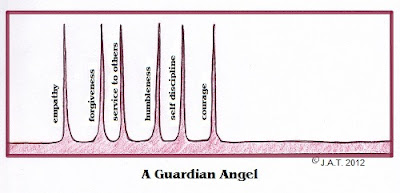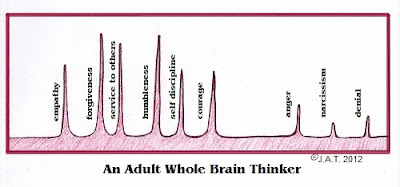TBM37: Dreams – The Courage to Trust the Science of Sleep
One thing people on a spiritual path are very curious about is dreams. What are dreams? Where do they come from? Why do we have them? What do they mean? Does God send us messages in our dreams?
This is a huge topic, and I can’t answer these questions in a single post, but I’d like to point out a few things you need to know about sleeping and dreaming if you want to stay healthy while you follow the Spiral Path.*
The number one thing you need to know — based not on religious teachings but on a huge body of scientific research — is that you need to get a good night’s sleep (or a good day’s sleep if you’re a shift worker). If you want to have a healthy brain, you need to set aside a single block of sleep time each day, a single block of uninterrupted time that’s 8 hours long or so. Your brain requires this time because it does a lot of work for you while you’re sleeping.**
I’ll come back shortly to the question of people who need to get up several times in the night for compassionate reasons — for example, young parents or caregivers who are looking after someone who’s ill. For the moment, I’m talking only about adolescents and adults who have a choice about their daily schedule and a choice about their nighttime activities.
Chronic sleep deprivation is currently wreaking havoc on the brains of people in our society. Perhaps you think I’m exaggerating, but this is one of those instances where I have lots and lots of scientific research on my side. So I don’t have to apologize for my strong statement about sleep deprivation. It’s the honest truth.
I have no tolerance — absolutely none — for any spiritual or religious teaching that barrels over the realities of sleep health like a tank on a military mission. I have no tolerance for any religious tradition that requires you to wake up part way through your sleep cycle so you can pray. I fully understand people’s desire to be in sincere communication with God, but if you really want to be in sincere communication with God, then please respect the way God designed your brain, and please make sure you get the sleep time God wants you to get.
You’ll be able to hear God and God’s angels much more clearly if you honour the teachings that come to you through current brain research (even though such research seems to contradict the wisdom of ancient religious teachings). There’s a reasonthat so many studies have linked sleep disorders to a whole slew of physical and psychological health disorders. Chronic sleep deprivation and chronic sleep interruption (eg. sleep apnea) are as toxic to your brain’s health as chewing lead paint off an old wooden spoon. You may not notice the effects at first, but you sure as heck shouldn’t be surprised when you start having health problems. Health problems are a biological consequence of your failure to get long blocks of natural sleep. If you already have a sleep disorder, then you know what I mean. When this major system of your body is “broke,” it ain’t pretty.
I’ve tried to emphasize on this site that everyone on Planet Earth is equal on the Spiral Path. Everyone has equal access to the wonder of it. Everyone has — or should have — equal access to the basic tools. The basic tools — free will, education, self-discipline, courage, empathy, brain health, teamwork — don’t require lots of money. They don’t require special rituals. They don’t require obedience to religious laws. But they do require trust — trust in the scientific realities of God’s good creation.
The need for natural sleep is one of the scientific realities of God’s good creation here on Planet Earth. It’s a scientific reality that can’t be circumvented by religious or cultural laws, no matter how much we’d like to believe in our own ability to “rise above” such petty biological concerns as sleep.
I know, of course, that many ambitious individuals in this world think sleep is a nuisance, and, even more significantly, that sleep is a sign of weakness, a sign shown only by needy and pathetic underlings unworthy of the right to lead others.
These ambitious Type A individuals (as they used to be called) are the same human beings who have lost all (or most) of the connections between the Darwinian Circuitry and the Soul Circuitry inside their own brains. Their brains are operating on a steady diet of status addiction, anger, contempt for others, narcissism, and denial. They no longer need as much sleep as other people because, to be honest, their own brains have less work to do at night.
This isn’t a good thing, by the way. It’s never a good thing when your own brain stops working the way it’s supposed to. It’s not a sign of strength or superiority when you only need 4 hours of sleep each night. It’s a sign that you’ve seriously fucked up your own brain.
Those who don’t sleep well also don’t dream well. Did you know that many people don’t actually have dreams? Not ones they can remember, anyway. Yeah, no dreams. It’s more common than you think. But most people who suffer from this kind of “dream disorder” don’t want to admit it out loud because they suspect, somewhere deep inside, that it isn’t biologically normal for a person to be “dreamless,” so to speak.
I’ve noticed a pattern over the years in the type of person who’s likely to confess he or she never remembers dreams. The people I’ve personally known who are “dreamless” are all high-functioning people in their waking lives, people who are meticulous, perfectionistic, highly rational, and bulldog-like in their relationships with others. These people mistrust sentiment, have little sympathy for the suffering of people they don’t know, hold politically conservative views, and cherish the values of duty, honour, obedience, and denial of pain. In psychological terms, they would score high on the “Negative Emotionality” or “Neuroticism” dimension of the Big Five Personality scale. They would also score high on the “Agreeableness” dimension of the Big Five.
These two dimensions — the Neuroticism dimension and the Agreeableness dimension — generate traits that are linked to the brain’s Darwinian Circuitry. The other three dimensions in the Big Five model — Extraversion, Openness, and Conscientiousness — are linked to the brain’s Soul Circuitry.
A human being whose brain is balanced and healthy will exhibit behaviours that seem, well, balanced across all five dimensions. Such a person is open to new experiences, but not so open that your brain falls out; conscientious without being obsessive or controlling or perfectionistic; agreeable and willing to compromise with others, but not willing to be an enabler of addictive behaviours; comfortable in relationships with other people, but also comfortable spending some time alone (as when sleeping!); alert to surrounding situations and stressors, but not preoccupied or obsessed by them.
This is a lot to balance, and it’s very hard for your brain to maintain this balance if you refuse to give your brain the time and energy and nutrients it needs so it can sort and label and store and heal the data it receives every day through your many experiences. Dreams are a significant part of the nightly sorting process.
Human beings are born with the capacity to have three different kinds of dreams. Each does a different job. But they all share one thing in common: they activate the primary visual cortex of the occipital lobes. This is why dreams are accompanied by visual images.
The first kind of dream you can have is purely biological. It’s the kind of dream nobody remembers clearly. It’s a sort of visual record that your brain transmits as it’s doing its nightly housecleaning. It’s a bit like an Excel spreadsheet accompanied by pictures on little Post-It notes. There’s no coherent story line — it’s really just a bunch of important snapshots taken at different times during the previous day. These dreams aren’t especially memorable, and they don’t have much emotional content. (Like an Excel spreadsheet with little pictures.) Important and necessary, but not what you’d call juicy.
Second is the kind of dream that’s more personal, more emotional, and more memorable. If you can remember your dreams, you’re most often remembering dreams from this category. When you have dreams of this kind, what you’re really doing is talking to yourself. Your soul is talking “out loud,” so to speak, with pictures and words and actions. Even more important, your soul is talking about emotions — honest feelings about choices you’ve made. The soul is nothing if not truthful and honest. So if your brain has made some choices your soul doesn’t like, your soul will pipe up while you’re asleep and will express feelings such as fear, anxiety, or a desire to do better (i.e. guilt). (Yes, your own soul can be afraid of choices made by the Darwinian Circuit of your own brain. This is called conscience. If you stop listening to the voice of your own soul — and many, many people do — your brain will stop accepting input from the parts of the brain wired to help you express your Openness, Conscientiousness, and Extraversion. Your brain will also stop sending you output in the form of personal dreams. You won’t have personal dreams anymore until you heal your brain.)
The third kind of dream is the kind of dream that’s experienced least often and is written about most. The third kind of dream is the message dream — the direct communication that takes place between you and God, or between you and God’s angels. Message dreams are only possible if you’re in an “open” state.
If you’re never in an open state (because you’ve chosen to reject input from the Soul Circuitry of your brain) you won’t get this kind of dream. Message dreams can only be received by a brain that’s relatively healthy and balanced. (Sorry — no exceptions.) So-called “oracular dreams” that come to you after you’ve used drugs or alcohol or intentionally induced trance states DO NOT COUNT. If you use outside means to try to receive a dream message from God, you’re likely to hear and see many fantastical things, but none of them will be messages from God.
Just because you can’t receive dream messages from God, it doesn’t mean God has abandoned you. Far from it. God never abandons anyone. But you have to accept the scientific reality that a closed brain can’t receive clear messages — either awake or asleep — and you have to work around this particular form of disability. There are plenty of other ways that God can — and does — communicate with you. If you can’t dream at present because your brain is in need of some serious healing, please be patient. Help is all around you.
Last, I’d like to return to the question of sleep deprivation in situations that can’t be helped, such as feeding and caring for an infant at night.
A young infant has strong biological and emotional needs that must be met by the parents or caregivers, and in a case like this — where you’re getting up in the night because someone else needs you and because you care — God and your angels will lend you extra support. You don’t have to ask for this support (though a prayer of thanks and gratitude is always appreciated!!). All you have to do is get up in the night because your heart tells you it’s the right thing to do. As long as you stay “in the zone” of caring and worrying about another person, God will look after the relevant wiring in your brain.
If, on the other hand, you’re getting up at night solely because you “have to” — solely from a sense of duty or obligation or feeling sorry for yourself — you won’t get the angelic support your body needs. Why not? Because you’re not being your true self — the loving, emotionally supportive person you’re capable of being. God has free will, and God does not enable choices or behaviours that snuff out the messages of the soul and replace those message with ideologies of perfectionism, superiority, victimhood, or obedience to religious law. So if you’re getting up in the middle of the night to recite traditional prayers so God will be properly “assisted and nourished,” you’re shooting yourself not in the foot but in the head. You’re ruining your own sleep cycles — intentionally and on purpose — because you believe you’re “helping” God, but all you’re doing is making it harder and harder for you to ever hear God’s quiet voice in your life.
God doesn’t need this kind of “help.” And neither do you.
One great thing about being asleep is the quiet. Once you’re finally asleep, it’s quiet in the kingdom of your own biological head. It’s in this place of quiet that God’s voice is most easily heard.
God the Mother and God the Father are very quiet and shy, you see. They love to laugh and they love to sing, but they’re both very quiet. They laugh and sing in some places, but in other places they’re the quiet of dew-laden rose petal, the quiet of the morning mist, the quiet of deep waters, the quiet of the sun’s rays silently bearing life to this wondrous planet we live upon.
If you’re very quiet and very open to the Heart of God the Mother and God the Father, you’ll feel the joy and tenderness of their embrace as a deep inner sense of comfort and safety that’s hard to describe.
I invite you to slip into quiet sleep tonight and feel the kindness and shyness of their love.
- Sleep ‘cleans’ the brain of toxins
- ‘Arrogance’ of ignoring need for sleep
- Sleep’s memory role discovered
- Brain ‘can classify words during sleep’
- Regular naps are ‘key to learning’












